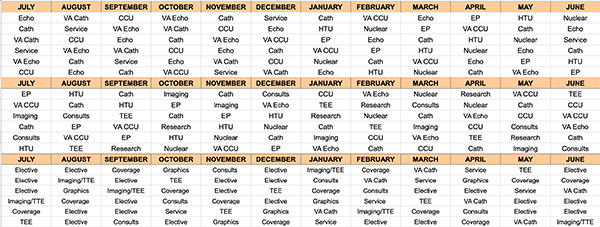Clinical Rotations & Research Curriculum
Clinical Rotations
Electrophysiology
The goal of this rotation is to provide fellows with an introduction to arrhythmia management, device implantation indication, and device interrogation. The rotation will consist of EP ward consultation, device interrogation, pre- and post-procedure evaluation in collaboration with the attending electrophysiologist and EP fellow. The general fellow will also have the opportunity to assist in electrophysiology procedures.
Cardiac Catheterization Lab
Fellows rotate through the cardiac catherization laboratory at Loyola University Medical Center and VA Hines Medical Center and will learn the knowledge base and skills required to perform adult diagnostic cardiac catheterization. General fellows will have exposure to a high volume and wide variety of cardiac procedures including complex coronary interventions, valvuloplasty, intracoronary ultrasound, atherectomy and peripheral interventions. In addition, Loyola has a robust structural program that allows the fellows to be exposed to a number of advanced and investigational device protocols such as percutaneous valve replacement.
Echocardiography
The goal of this rotation is to provide fellows with the ability to perform and interpret echocardiograms. Fellows perform transthoracic, transesophageal, and cardiac stress echocardiograms in collaboration with attending physicians. Daily didactic instruction on echocardiogram interpretation is provided by echo lab faculty.
Coronary Care Unit
This clinical rotation provides cardiology fellows exposure to the diagnosis and treatment of a wide range of acute clinical problems encountered by critically-ill patients with cardiovascular disease. Fellows will assist in the supervision and education of a team of residents, interns, and medical students.
Cardiology Ward Service
This is a clinical rotation that provides fellows exposure to the diagnosis and treatment of a wide range of clinical problems encountered by patients with cardiovascular disease admitted to a general cardiology medical floor.
Consultation Service
The goal of this rotation is to expose fellows to a broad range of acute and chronic cardiovascular problems and to develop the skills vital to providing appropriate consultation to other medical services.
Advanced Heart Failure/Heart Transplant
This rotation will include daily rounds of congestive heart failure (CHF) and heart transplant patients. Fellows will perform bedside hemodynamic monitoring and right heart catheterization under the supervision of the attending physician. Fellows will assume an active role in therapeutic decision making for CHF and pre-and post-transplant patients and gain exposure to comprehensive management of heart transplant recipients. Fellows will gain exposure to selection and management of VAD and/or total artificial heart patients.
Advanced Cardiovascular Imaging
This rotation is designed to provide clinical and research training through hands-on and didactic exposure to cardiovascular magnetic resonance imaging, computed tomography, and nuclear cardiology. This training is undertaken under the direct supervision of full-time qualified level 2- and level 3-trained cardiology faculty and nuclear medicine faculty.
Outpatient Continuity Clinic
All fellows are assigned on average one half day of outpatient cardiology clinic per week divided between the outpatient cardiology clinics at Loyola University Medical Center and VA Hines Medical Center.
Research Curriculum
Background
Research training is vital to preparing fellows for a well-rounded career rooted in the scientific method and the practice of evidence-based medicine, and is a mandatory component of the training program.
All fellows are expected to conduct research and scholarly activity during their fellowship, present at scientific meetings, and publish their results.
Educational Goals
- To perform effective scientific literature searches.
- To learn how to collect, organize and interpret primary data.
- To learn about different research methodologies and how they apply to a research project.
- To understand basic statistical analysis principles.
- To develop tools to formulate a research question and implement scientific method.
- To gain editorial experience in writing abstracts, creating research poster and manuscripts.
Timeline and Dates
Year One
Upon matching into the fellowship and through the first year, fellows will begin the process of identifying areas of research interests and potential faculty research advisors. By the end of the first year, fellows are expected to have identified at least one core faculty research advisor and the topic of investigation.
Year Two
The fellows will start year two with a presentation of their research area of interest and plan to the fellowship Associate Program Director and research advisor. The remainder of the year is dedicated to implementing their research plan.
Year Three
Fellows will continue to conduct research into their third year and submit abstracts for conference presentations and manuscripts for publication. At the end of the third year, fellows are expected to present their research to the Division.
In support of the fellows’ continued medical education and scholarly activity, the program provides an educational stipend and time off to encourage fellows to travel to prominent national Cardiology meetings.
This stipend is intended to promote fellows attendance at these meetings. Each fellow is allowed an educational stipend amount of $1,200 meetings. There is an additional $500 available (for a maximum of $1,700 per academic year).

